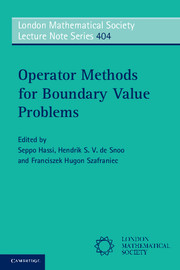Book contents
- Frontmatter
- Contents
- List of contributors
- Preface
- 1 John Williams Calkin: a short biography
- 2 On Calkin's abstract symmetric boundary conditions
- 3 Boundary triplets and maximal accretive extensions of sectorial operators
- 4 Boundary control state/signal systems and boundary triplets
- 5 Passive state/signal systems and conservative boundary relations
- 6 Elliptic operators, Dirichlet-to-Neumann maps and quasi boundary triples
- 7 Boundary triplets and Weyl functions. Recent developments
- 8 Extension theory for elliptic partial differential operators with pseudodifferential methods
- 9 Dirac structures and boundary relations
- 10 Naĭmark dilations and Naĭmark extensions in favour of moment problems
- References
8 - Extension theory for elliptic partial differential operators with pseudodifferential methods
Published online by Cambridge University Press: 05 November 2012
- Frontmatter
- Contents
- List of contributors
- Preface
- 1 John Williams Calkin: a short biography
- 2 On Calkin's abstract symmetric boundary conditions
- 3 Boundary triplets and maximal accretive extensions of sectorial operators
- 4 Boundary control state/signal systems and boundary triplets
- 5 Passive state/signal systems and conservative boundary relations
- 6 Elliptic operators, Dirichlet-to-Neumann maps and quasi boundary triples
- 7 Boundary triplets and Weyl functions. Recent developments
- 8 Extension theory for elliptic partial differential operators with pseudodifferential methods
- 9 Dirac structures and boundary relations
- 10 Naĭmark dilations and Naĭmark extensions in favour of moment problems
- References
Summary
Abstract This is a short survey on the connection between general extension theories and the study of realizations of elliptic operators A on smooth domains in ℝn, n ≥ 2. The theory of pseudodifferential boundary problems has turned out to be very useful here, not only as a formulational framework, but also for the solution of specific questions. We recall some elements of that theory, and show its application in several cases (including new results), namely to the lower boundedness question, and the question of spectral asymptotics for differences between resolvents.
Introduction
The general theory of extensions of a symmetric operator (or a dual pair of operators) in a Hilbert space, originating in the mid-1900's, has been applied in numerous works to ordinary differential equations (ODE), and also in a (smaller) number of works to partial differential equations (PDE).
There is a marked difference between the two cases: In ODE, the playground for boundary conditions is usually finite-dimensional vector spaces, where linear conditions can be expressed by the help of matrices. Moreover, the domains of differential operators defined by closure in L2- based Hilbert spaces can usually all be expressed in terms of functions with the relevant number of absolutely continuous derivatives.
In contrast, boundary conditions for PDE (in space dimensions n ≥ 2) are prescribed on infinite-dimensional vector spaces. Moreover, the domains of differential operators in L2-based spaces will contain functions with distribution derivatives, not continuous and possibly highly irregular.
Information
- Type
- Chapter
- Information
- Operator Methods for Boundary Value Problems , pp. 221 - 258Publisher: Cambridge University PressPrint publication year: 2012
References
Accessibility standard: Unknown
Why this information is here
This section outlines the accessibility features of this content - including support for screen readers, full keyboard navigation and high-contrast display options. This may not be relevant for you.Accessibility Information
- 1
- Cited by
